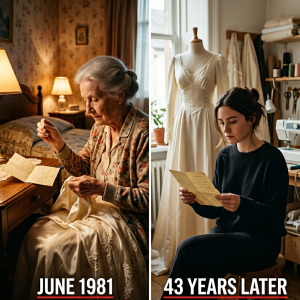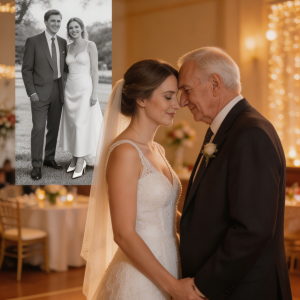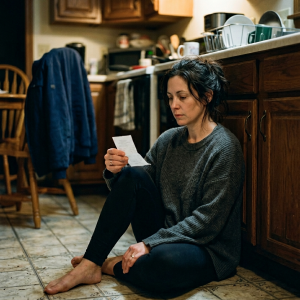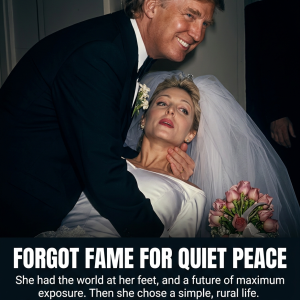Every morning at 4:30 a.m. sharp, Claire Dawson unlocked the door to Maple & Grain, a snug little bakery clinging to a gentrifying Portland block now crowded with slick condos and artisan cafés. At 33, she was as much a landmark as the neon “OPEN” sign—famed for croissants that shattered in buttery flakes, cinnamon rolls that dissolved on the tongue, and a warmth that lingered in the air long after she’d gone home.
Before espresso machines hissed or the first customer tugged the door, Claire followed a private ritual. She wrapped a still-steaming cinnamon bun, filled a to-go cup with black coffee, and slipped out the side exit. Two blocks away, at a weather-scarred bus stop, she set the bundle on a splintered bench beside a napkin lettered in looping ink: “Wishing you a peaceful morning.”
The gift always found the same recipient—a quiet, silver-haired man in a frayed coat. He never begged, never spoke, never lifted his eyes for more than a breath. Claire didn’t know his name, and he never asked hers, yet the silent exchange happened every dawn.
Back at the bakery, whispers swirled.
“She’s throwing away product,” one coworker scoffed.
“She’ll just encourage him to hang around,” another warned.
Claire kneaded dough and ignored them; kindness, to her, wasn’t a currency to be tallied.
When new owners arrived, Claire was summoned for a “performance chat.”
“Your passion is admirable,” the manager began, choosing words like eggshells. “But some customers feel uneasy seeing… that man nearby. Could you donate to a shelter instead?”
Claire smiled, promised to think it over—and simply started leaving earlier so no one would notice.
Weeks later a cashier confided to a patron, “She’s fed him every day for years.”
The customer sighed, loud enough for Claire to hear. “Poor girl—thinking she’s changing anything.”
Claire folded pastry with steady hands. She wasn’t after applause. She was after dignity for someone everyone else edited out of their morning.
Her mother had once clucked, You give too much, Claire.
Claire believed generosity multiplied, not depleted. Her fiancé, Ben—a children’s librarian with smile-soft eyes—agreed. “You don’t just bake,” he told her. “You notice people.”
Spring wedding plans bloomed: Claire ordered her own cake from Maple & Grain and wrote invitations as if kindness were confetti. Two days before the vows, an unmarked envelope arrived. Inside, a single line in neat cursive: Tomorrow I will come—not for cake, but to repay a kindness. The handwriting tickled a memory she couldn’t place.
Wedding morning: Claire, laced into ivory satin, peeked from the bridal suite at guests milling outside. There—by the church doors—stood the bench-side stranger, awkward in a freshly pressed, though threadbare, suit.
Gasps rustled when she lifted her skirt and hurried toward him, photographers forgotten.
“I didn’t think you’d come,” she whispered.
“I wasn’t sure I belonged,” he answered.
“I’m glad you’re here.”
He offered a small, hand-stitched napkin. “My daughter embroidered this long ago. It should be with someone who understands its worth.”
“Would you walk me down the aisle?” she asked.
Tears trembled in his eyes. He nodded, and together they entered the hush of the sanctuary. Ben, waiting at the altar, met them with a knowing smile.
The ceremony was brief, bright with laughter and promises. Claire tucked the embroidered napkin into her bouquet.
At the reception, guests surrounded the gentleman—some offering apologies, others simple greetings. Before leaving, he handed Claire and Ben an envelope containing a faded photograph of a modest bakery, flour clouds caught in the window. On the back: My wife baked; I washed dishes. We served our neighbors until life shifted. Thank you for reminding me how kindness tastes.
Claire framed the picture above Maple & Grain’s counter. She never saw the man again, yet month after month postcards arrived—each depicting a café or bakery somewhere in the world with the message: Breakfast shared is hope restored.
Moved, Claire and Ben used part of their wedding savings to build The Morning Shelf—a wooden rack outside Maple & Grain stacked daily with free pastries and coffee. No lines, no forms, no judgment.
Neighbors joined in. The florist left small bouquets; the bookstore slipped in gently used novels; someone hung knitted gloves during winter. The shelf became a quiet exchange of grace.
One disheartening morning, Claire found the rack empty—until a woman in worn clothes taped up a note: Please don’t stop. You saved my week. Claire, not prone to tears, wept then.
Years rolled on. Maple & Grain’s pastries drew lines, but its spirit drew hearts. Children—Claire’s and Ben’s among them—scribbled notes for strangers: Have a beautiful day. You matter. Thanks for being here.
Sometimes the grandest transformations hatch from something as small as a cinnamon roll and a folded napkin. The man from the bench never reappeared, but his legacy rose with every loaf, sweetened every cup, and echoed in every quiet act of morning kindness.
This narrative is inspired by real acts of generosity but is ultimately a work of fiction. Names, locations, and events have been reimagined for storytelling purposes. Any resemblance to actual persons or businesses is coincidental. The author and publisher make no warranty regarding factual accuracy.





